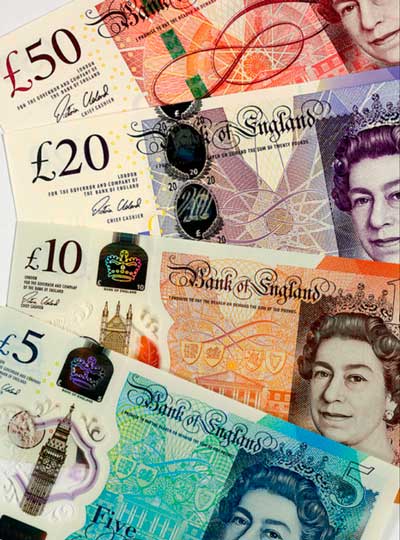Pound notes in circulation
In recent weeks we have received many inquiries in our Customer Service Center about the Pound banknotes that are currently in circulation. For this reason we are going to explain you which are the legal tender notes to solve all your doubts.

Pound Sterling
The current Pound Sterling notes (valid in England, Scotland, Northern Ireland, Wales and some British overseas territories (such as Gibraltar) are 5, 10, 20 and 50 Pounds.
In 2016, the Bank of England issued a new 5-pound note and in 2017, a new 10-pound one. Both notes are made of polymer and currently their paper versions have already been withdrawn. So currently the 5 and 10 pound notes are made of polymer and those of 20 and 50 are still paper.
In 2020, the 20-pound polymer banknote will be issued and in the following years the same will be the case for the 50-pound banknote.
Scottish Pound
The valid notes of the Scottish Pound are 5, 10, 20, 50 and 100 Pounds. In addition, Scottish banknotes are issued by three banks: Royal Bank of Scotland, Bank of Scotland and Clydesdale Bank.
Each bank has its own series of notes. But for you to have a basic notion, it’s the same as with the British Pounds: the 5 and 10 paper notes have been withdrawn. So the 5 and 10 Pound notes are made of polymer and those of 20, 50 and 100 Pounds are paper.
In the coming years the other denominations will be progressively renewed.
Pounds from Northern Ireland
The legal tender notes of Northern Ireland Pounds are 5, 10, 20, 50 and 100 Pounds. As with the Pounds of Scotland, there are several banks that issue them. In this case there are 4: Bank of Ireland, Danske Bank, First Trust and Ulster Bank. Among these only the Bank of Ireland and the Ulster Bank issue all denominations. Danske Bank and First Trust only issue 10 and 20 Pound notes.
In the case of the Pounds of Northern Ireland, all current notes are currently paper. It is anticipated that some of the banks will start issuing polymer bills starting in 2019.
As you can see, the banknote renewal process has begun, but there are still denominations to change. In the next few years, the notes will be renewed and old tickets will be removed from circulation. So from Eurochange we recommend that you don’t keep notes if you don’t plan to travel again in a short time, since it is possible that while you have them, they will be removed.
Once withdrawn from circulation, the only way to exchange these notes is at a branch of the Bank of England or one of the issuing banks in the case of the Scottish or Northern Ireland Pounds.
If you don’t want to waste a few hours of your next vacation in the process of changing the old notes, change your leftover Pounds just returned from travel.
June 25, 2018
REPLIES

